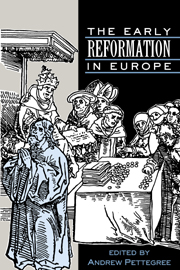8 - England
Published online by Cambridge University Press: 06 January 2010
Summary
The English Reformation was the creation of the English monarchy, more an act of state than in any other part of Europe apart from Scandinavia: the result of one man's obsessive quest for a male heir, rather than a nation's search for the way back to the Church of the Apostles. If Henry VIII had not sought a divorce from his first wife at the wrong moment for the Papacy, it is unlikely that he would have been propelled away from Rome, and it is unlikely that anyone else in England would have had the strength to force a break against his will or the will of his successors. Sixteenth-century England was one of the most centralised states in Europe; Henry VII (1485–1509) and Henry VIII (1509–47) had brought it out of a long political crisis to a remarkable degree of subservience to royal wishes. The kingdom which the Tudors controlled so effectively was largely a patchwork of rural societies. Where one can discern urban Reformations in England, they were small-scale and circumscribed by government policy, because English urban centres were nearly all small and limited in initiative by Continental standards. Only London could challenge comparison with the Imperial cities of Germany, and London's weight was never decisively or consistently thrown behind either conservatism or reform; both viewpoints were strongly represented among its clergy and people, but neither side could outface the other without the necessary lead from the Crown up the river at Westminster.
Only occasionally did the English Crown's command of events falter.
- Type
- Chapter
- Information
- The Early Reformation in Europe , pp. 166 - 187Publisher: Cambridge University PressPrint publication year: 1992
- 1
- Cited by

